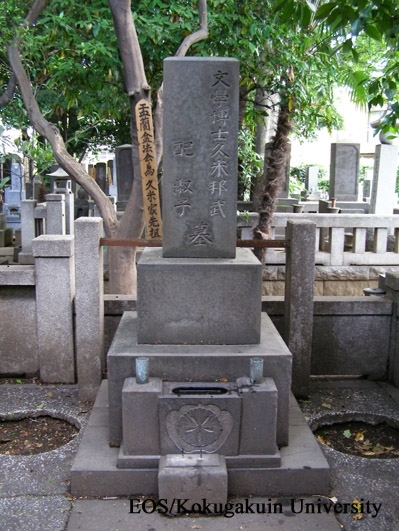- トップ
- Encyclopedia of Shinto
- Kume Kunitake
Encyclopedia of Shinto
| Main Menu: | |
| Links: |
詳細表示 (Complete Article)
| カテゴリー1: | 8. Schools, Groups, and Personalities |
|---|---|
| カテゴリー2: | Personalities |
| Title | Kume Kunitake |
| Text | (1839-1932) Scholar of modern Japanese history (D.Lit). Born on the twenty-first day of the seventh month of 1839 to a retainer of Saga Domain in Hizen Province (in present-day Saga Prefecture). In 1871, he was appointed secretary of Iwakura Tomomi's delegation (the Iwakura Mission) as it toured America and Europe. After returning to Japan, he worked at the records department of the Department of State (Dajōkan) editing public documents, and in 1878 published the well-received record of the Iwakura Mission entitled Tokumei zenken taishi beiō kairan jikki. He then became an editor at the Institute of Historiography (Shūshikan) in March 1879, where he was involved in compiling official histories, and in October 1888 he became a professor in the College of Humanities at Tokyo Imperial University, where he also served as member of the committee of the Office of Historiographical Compilation (hennenshi hensangakari). In March 1892, however, the publication of his essay "Shintō wa saiten no kozoku" (Shinto: the Out-dated Custom of Worshiping the Heavens) led to his forced retirement. Thereafter he lectured at Rikkyō and Waseda Universities and turned to writing. Strongly influenced by his times, he set about reinterpreting the mythical story of the "Divine Age" (jindai), attempting to fix its actual place in history based on theories taken from Chinese studies and the popular currency of the theory of evolution. He died in Tokyo on February 24, 1932 at the age of 93. He was the author of many works, including Tōkai Tōsan junkō nikki (Diary of the Emperor's Tours Along the Tōkaidō and Tōsandō), Komonjogaku kōgi (Lecture on the Study of the Classics), Nihon kodaishi (History of Ancient Japan), Nambokuchō jidaishi (History of the Namboku Era), Jōgū Taishi jitsuroku (True Account of Shōtoku Taishi), Kokushi hachimenkan (A View of Eight Aspects of National History), Uranippon (The Other Side of Japan), Jisei to eiyū (The Tide of the Times and Heroism) and Nabeshima Naomasa kōden (A Direct Account of Nabeshima Naomasa). - Akimoto Nobuhide |




